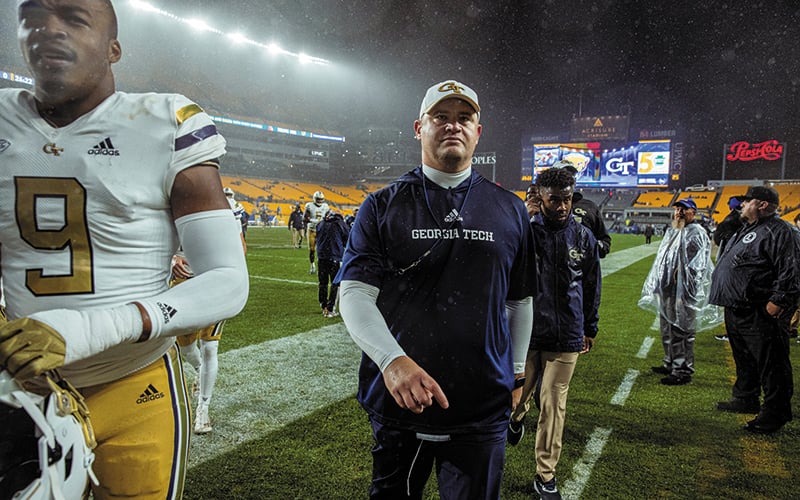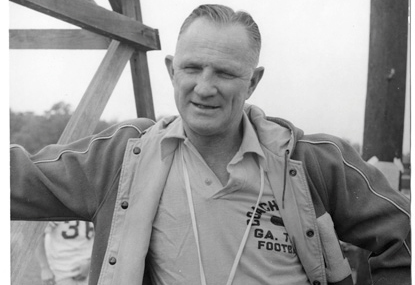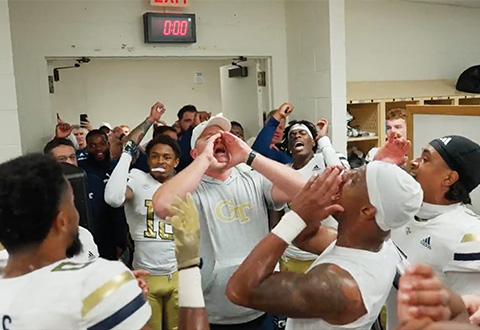Unlocked Potential
By: Shelley Wunder-Smith, Photos courtesy of Georgia Tech Athletics | Categories: Sports

Ask someone who knows Brent Key what he’s like, and you’re liable to hear the same description: He’s deeply meticulous, and you won’t meet someone who loves Georgia Tech more. And four games into the season last fall, these were qualities the Institute’s football program needed desperately. Tech faithful are familiar with the story: Since 2019, the Yellow Jackets had only won three games each season, none consecutively; this past season, they had lost three of their first four games, including an ignominious 42-0 shutout by Ole Miss. The program was in need of a midseason change. Last September, Tech President Ángel Cabrera announced leadership changes, removing both head football Coach Geoff Collins and Athletic Director Todd Stansbury, and tapped Assistant Head Coach Brent Key as interim head football coach.
Key later described this as the start of “a 10-week interview” for the permanent head coach position—a role for which Key had been quietly, consistently preparing for since the moment he set foot on Tech’s campus 26 years earlier to play right guard for the 1996 Yellow Jackets under Head Coach George O’Leary.
"The Glue" of the Offensive Line
Joe Hamilton, HTS 07, former quarterback, 1999 Heisman Trophy runner-up, and current Yellow Jackets radio color analyst, played with Key for three years. He recalls noticing Key early: “Every year when football camp starts, you obviously want to know who among the freshman class will step up. Brent Key’s name kept coming up as someone who worked hard and had a true offensive-line personality. He set a tone for the team.
“He took pride in being an offensive lineman,” Hamilton continues, “with a mentality of ‘I’m not going to be cocky, but my job is to finish you off.’ From a leadership standpoint, he made it clear he wasn’t going to cut any corners—not in the weight room, not on the football field—and he wanted the guys to follow him.”
Key’s understated, diligent work ethic meshed perfectly with Coach O’Leary’s style.
"Coach O’Leary emphasized toughness, accountability, and responsibility—for his players and his coaching staff,” recalled Key.
Key’s fellow players acknowledged his hard work and leadership when they elected him team captain his senior year; midseason, the Atlanta Journal-Constitution (AJC) described him as “the spiritual leader of the renovated Jackets front line. The glue that has brought it along.”
The four years in which Key played under O’Leary were some of the football program’s most successful. The Yellow Jackets made four straight bowl appearances—for the first time since 1953–’56— and in 1998, Georgia Tech was football co-champion of the ACC. Perhaps just as important to Tech fans, the Jackets beat the University of Georgia three years in a row, which hadn’t happened since Bobby Dodd’s era. With Key on the offensive line, Georgia Tech led the ACC in rushing yardage three times.
Climbing Up From "The Lowest Rung of the Ladder"
When Key graduated in 2001 with a degree in management, he recognized that he wasn’t going to have a career in the NFL, but he wasn’t sure what to do next. O’Leary gave him the opportunity to stay on with the football program as a graduate assistant.
It is perhaps the only time in his life when Key has been confounded by hard work.
Reflecting on that experience, he said, “You go from being team captain, All-ACC, the top dog on the team to the lowest rung on the ladder. Halfway through the season, I felt like there was zero chance—none—I was going to be a football coach.”
With the help of Institute alumni, Key briefly explored a career in commercial real estate. He quickly concluded that suits, ties, and cold-calling all day was not for him. He soon began looking for a pathway back to football. In 2004, Western Carolina hired him as their tight end/running backs coach. The following year, O’Leary, now at University of Central Florida’s football program, offered him another graduate assistant position. Key took it, put his head down, and worked doggedly for the next decade to become assistant head coach and offensive coordinator.
He also used this extended period to absorb all he could from his mentor about being a good coach.
Key explained, “Coach O’Leary is such a detailed, organized, discipline-minded person, and a lot of times you might hate that as a young coach. He would put us on the board and make us draw a football field and then diagram it exactly. If you drew plays and the circles and lines weren’t perfect, he would stand up and erase everything. I would think, ‘I have a degree from Georgia Tech, and I’m drawing circles!’ But it’s things like that—attention to execution in the small details—that create the opportunity for you to be successful, whether you’re a football coach or a CEO.”
His boss and mentor made a similar observation about Key. In a December 2022 AJC article, O’Leary commented that he watched Key climb the coaching ranks “with an attention to detail and work habits that told [me] he might someday be a head coach.”
"Going Home To Tech"
While at UCF, Key met and married his wife, Danielle, who was on the athletic department’s marketing team. They now have a 4-year-old daughter named Harper. The couple moved to Tuscaloosa, where Key served as the Crimson Tide’s offensive line coach under Nick Saban, who recruited Key and reorganized his own coaching staff to give him a place.

At Bama, Key proved instrumental to the Tide winning two Southeastern Conference championships and the 2017 national title. His offensive lines were repeat finalists for the Joe Moore Award, presented to the year’s top offensive unit. In 2019, Key’s prospects for continued success at Alabama seemed clear.
But then Georgia Tech came calling, and Key answered.
No one close to Key was surprised.
“When we were at Alabama, the only job he even contemplated moving our family for was for something at Tech,” Danielle says. “And then a position opened up, and when it did, he told me, ‘I think it’s time to go home.’”
As assistant head coach and offensive line coach/run game coordinator, Key excelled at the Institute just as he had as a player. The Jackets’ record in recent years belies the success Key built with his players, which included overseeing the Jackets’ challenging transition from an option-based offense to a pro-style spread attack.
Even so, the Georgia Tech community was wondering what could be done to fix the football program as a whole.
“As a former player, it was frustrating,” admits Yellow Jackets Defensive-Backs Coach Travares Tillman, Mgt 10. (He and Key played on the same Georgia Tech team.) “You try to find answers, try to connect things, but it’s not working. Sometimes things are out of your control, and you just try to make the best of the situation. But I can also say that for me personally—and for Coach Key, because I know him—we were determined to turn things around.”
Key has always worked to prepare for whatever opportunities might arise, both for himself and for the team.
“While you can’t always plan for the future, you can put things into place and be prepared. You always want to prepare yourself for what might come along,” he says.
"A 10-Week Interview"
On a sunny September day, Key walked down to the Georgia Tech athletic facilities from Wardlaw Center after a meeting with President Cabrera. He had just learned he had been named interim head coach in the wake of Collins’ termination. Despite the chaotic circumstances, Key’s mind was on the game coming up, against No. 24 Pitt.
"Once they told me what was transpiring, I wanted to get right back to work since we had a game in four days, and we had a lot of work to do,” Key says. “It wasn’t emotional; the focus was on getting the kids prepared.”
Almost unbelievably, the Jackets beat Pitt, then followed that success with a win against Duke—the first back-to-back wins for Tech since 2018. The team went on to beat No. 13 UNC, and Key finished the season at 4-4 as interim head coach. Shortly after, recently hired Athletic Director J Batt made Key’s head coach position official, and in so doing thrilled fans, alumni, and Key’s own athletes.
“Coach Key tells us every day that you win football games by doing your job,” says Yellow Jackets offensive lineman Joe Fusile, an electrical engineering major. “And the way you do your job is by being tough, being focused, and paying attention to details. Do your job, do your job, do your job.”
When asked about his decision to put Key at the helm, Batt explains, “I’ve had the good fortune to be around some of the absolute best coaches in the business, and to watch how they go about their work. There are a lot of similarities in habits—attention to detail, a kind of grinding mentality—that I’ve seen in the best, and Brent embodies that. Plus, his passion for Georgia Tech is huge.”
Chris Weinke, the Jackets’ quarterbacks coach and co-offensive coordinator, recently noted that he’s never been happier as a coach than he is now, working under Key: “His messaging is consistent, and his work ethic is consistent. He’s not going to waver, because that’s who he is. And when you’re consistent, people buy in: not only the players, but the coaches, too.”
Despite the burgeoning excitement around the possibilities for the 2023 football season, Key isn’t looking that far ahead. At his first official press conference as head coach, Key promised to work “365 days a year” to defeat UGA, but his focus is on the present.
“If we don’t get our job done this afternoon, and in our football meetings, if we’re not better in today’s offseason workout than we were yesterday, we’ve got zero chance of doing anything,” he said. “The only success we’re going to have in the future is based on what we do today and how we prepare.”
"I have so much love and passion for Georgia Tech because of how much it has given me,” Key added. “It allowed me to play at the highest level of college football. It taught me how to solve problems. It’s where I established lifelong friendships. And I am grateful for the opportunity to give something back to the Institute, to our whole community of alumni, students, and fans, and to future generations of Tech men and women.”


